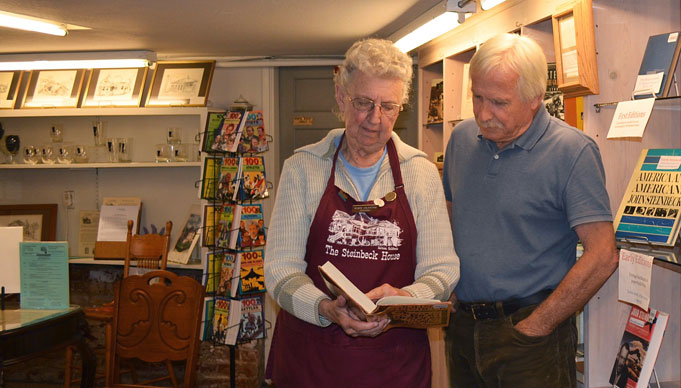Since moving to Salinas, California, I’ve volunteered twice monthly in the house where John Steinbeck grew up: one day assisting Chef Augie in the Steinbeck House restaurant kitchen and one working day in the Best Cellar, the book and gift shop in the basement that inspired the punny name. Because I work in the gift shop only once a month, it was a stroke of luck that I happened to be there on July 20, a busy day that began when my cohort John Mahoney and I saw reservations for 40 on the restaurant’s board upstairs. Forty was a good start. Counting walk-ins without reservations, it meant we could anticipate quite a few visitors to the gift shop before and after lunch. Even a slow day gets better when a “bluebird” visitor drops in and engages in fan chat about John Steinbeck. Along with near-record gift shop sales, July 20 also brought a bluebird encounter that I will never forget.
Even a slow day gets better when a ‘bluebird’ visitor drops in and engages in fan chat about John Steinbeck.
Shortly after we opened the door at 11 a.m., two parties came in: a father and teenage son from the Czech Republic and a 40-something couple from England with their small daughter. We’re used to foreign visitors in the gift shop, and the five we had that morning were talkative and friendly. Like his father, the teenager was clearly a Steinbeck fan—easy to tell as they zoomed past the shiny, pretty things and headed for the book section at the back of the shop. We stock some early editions of John Steinbeck, and the Czech father was visibly excited to find a vintage copy of The Red Pony to buy, lavishly illustrated, from the 1940s.
We’re used to foreign visitors in the gift shop, and the five we had that morning were talkative and friendly.
While the little English girl and her mum were occupied with the gift shop’s amazing dollhouse replica of Steinbeck House, one of our most popular not-for-sale items, John and I got to talking with the husband, who asked us what our favorite Steinbeck novel happened to be. We answered East of Eden, and he said he loved it, too. Then I mentioned that the first time I read the novel I dreaded getting to the end because I didn’t want the story to stop. The man’s response caught me by surprise: “Oh, my wife never did finish it for that reason.” I thought he was joking and turned to his wife. Yes, she said, ” I just didn’t want to know the end of those characters” after grieving over the death of Sam Hamilton, John Steinbeck’s grandfather, earlier in the story. Like me, she was familiar with the expression “book hangover,” which I confessed that I experienced when I finished reading East of Eden.
Like me, the woman from England was familiar with the expression “book hangover,” which I confessed that I experienced when I finished reading East of Eden.
Gift shop sales support the operation and maintenance of the house memorialized by John Steinbeck in East of Eden, and we were busy that morning. I would have welcomed more fan chat with the English couple, the Czech father, and the other bluebirds who visited during the day. Most of our out-of-town and foreign visitors on package tours of the Salinas-California area are focused on the rich history and Victorian architecture of the Steinbeck home. When lovers of Steinbeck’s fiction identify themselves, it’s a heartening reminder that our work helps to keep the house open and running. I’ve had other memorable experiences in the gift shop. But the standout will always be the English lady who couldn’t bring herself to finish East of Eden—not because it bored her, but because she loved the characters too much. I hope that some day she allows herself to read all the way to the end. Like the Steinbeck House, it’s graceful and glorious and gladdening.
Photo of Steinbeck House gift shop interaction by Angela Posada.



When this story was posted, the son of the woman in the picture posted it on his Facebook page. In the few days since, he has had 50 responses, including those from Japan, Paris London, Moscow, Georgia (the country) and Denmark…as well as from many of the US states. Many of the responders have written of their fondness for Steinbeck’s works and their understanding of the English woman’s predicament.